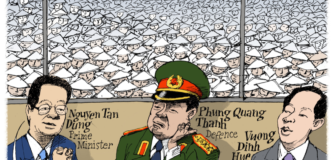Strong Argument with Little Vision
President Barack Obama’s Second Inaugural Address was a clear and sincere demand for equality, opportunity, and compassion. The speech called for unity in addressing contemporary challenges, and action in reaffirming American values. Among many issues, the president emphasized climate change, international peace, education, infrastructure, gay rights, care for the old and the sick, and economic fairness. He closed with an impassioned invocation of American greatness, and the confident claim that challenges (from the Civil War to the Civil Rights Movement) bring out the best in the American people.
Obama’s Second Inaugural will not stand out among the great speeches of our time, or our history. It will not inspire, and it will not convince skeptics. Although the speech was solid, and even radical at times, it sounded more like a state of the union (with a litany of programs) rather than a new call to arms for a new administration.
The speech tells us that the president will start his second term as he ended his last. He will continue to speak forcefully for Democratic programs that emphasize economic fairness and social justice. These programs are broadly popular, and they are the issues that helped reelect him in a hard fought campaign. The speech also tells us that the president will not offer a new vision for his second administration. He will double-down on what he believes in, and he will appeal over the heads of Congress to his public supporters.
The president’s speech and his strategy are sensible. By mobilizing his supporters and appealing to sympathizers, Obama is in a position to pressure a divided Republican Party. He can claim victory for legislative successes. He can blame Republicans for harming the country if they threaten to stymie his initiatives or even shut down the government. This strategy seemed to work already, as Republicans agreed in recent days to a temporary extension of the nation’s debt ceiling without major conditions.
President Obama’s Second Inaugural gives him a strong start on his new administration, but it is also a lost opportunity. To bring a divided country together, citizens need more than a persuasive list of programs. They need a new image of what our country is about, a new vision for what our future will be.
This is what the great inaugural speeches offered. We remember words from Abraham Lincoln, Franklin Roosevelt, and John F. Kennedy because they painted a new picture of the nation, and they offered a new stirring sentiment for bringing divided Americans together. The best inaugurals used words and emotions to move listeners into a new place.
Obama did not do that today. He did not articulate a new image of America. He did not provide new words to heal our divisions. Obama spoke well, but he did not transcend his majestic moment. Maybe that is just not possible in our days of continued national division.
The opinions expressed in this blog are personal and do not necessarily reflect the views of either Global Brief or the Glendon School of Public and International Affairs.









